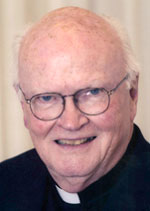About 40 years ago I was able to offer pastoral assistance to a young woman who lost her husband, a former student of mine, in a fatal car crash. She was left with a 5-year-old daughter and relatively few friends in Pennsylvania, far from her native Midwestern home. I celebrated the funeral Mass, took care of the burial and later helped the young widow enroll in law school and get on with her life. Some months later she hosted a dinner for those who had helped her in those very dark days, and I was on the guest list.
On the day of the dinner, during the normal hustle and bustle of preparation, my name was mentioned a few times, “Father Byron said this” or “Father Byron did that,” within earshot of the 5-year-old. “Whose father is he?” the child asked. The mother told me later that without thinking she found herself replying, “Anybody who needs one.”
That answer has stuck with me over the years. It explains a lot about the priesthood. I have often jokingly said to students on the Jesuit college campuses where I worked that I lived “in that home for unwed fathers they call the Jesuit community here on campus.”
That’s what we are: unwed fathers ready and willing to be a father to anyone who needs one. And, as each of us could relate from personal experience, there are a lot of people out there who appear to need one.
[hotblock]
Those who are fortunate enough to have one often fail to appreciate the father they have. They want distance and try to establish independence. But they could still benefit from the right kind of fatherly influence.
Those who lose a father through untimely death grow up wondering what he might have been like and are usually uneasy as the genetic trail is traced out for them and they are told that they look like their dad, even sound like him, and have some of his mannerisms. It never occurs to them that their movements recall for their mothers the presence of a husband now gone. They often don’t realize that there are father figures out there offering a good example for them to follow.
There are fewer ordained “fathers” around these days, far fewer than there were when I joined the Jesuits in 1950. The spectacle of happy men doing useful work attracted me to the Jesuits. It is a vocation, a “call,” of course, and the call is still going out, although fewer young men appear to be responding.
They tell me that numbers are improving in some seminaries and that the “Francis effect” is being felt. I hope that uptick signals a movement in the right direction. A good priest can be a father for anyone who needs one. And the need for that right now appears to be great. That’s another way of saying that “the harvest is ready” and that all of us should be praying to the Lord of the harvest to call in more laborers to bring it all in.
Many, if not most, people in my experience really do not believe deep down that God loves them. They need reassurance. A priest can provide that and thus function as a father “to anybody who needs one.”
***
Jesuit Father Byron is university professor of business and society at St. Joseph’s University, Philadelphia. Email: wbyron@sju.edu
PREVIOUS: Americans near and far honor Mary, our empress
NEXT: During holiday feasts, remember the hungry in this land of plenty



Share this story